Research Advice
Research in high school might be difficult to find, but it provides a unique opportunity to set yourself apart. Are you interested in discoveries, breakthroughs, and innovation? Or, are you simply looking for ways to push your education beyond the classroom walls?
This article is for you. Empowerly held a webinar with a representative from Lumiere Education last week and we learned a lot. Your host, Sarah P., guided a discussion with Stephen Turban about why research is important and how you can step up. So, let’s dig in to some valuable high school research advice!
To get you up to speed…
The webinar covered:
- How to do research in high school with top university researchers.
- The benefits of research for admissions (and what to look for in a research mentor).
- Different topics of research, and how to pick your own research question.
- And of course, questions and answers from the live audience.
Note from the Empowerly team: If you’re interested in more information about the webinar, send our webinar host an email at <sarah@empowerly.com>. On the other hand, if you’re interested in signing up for future events Empowerly will hold, sign up for email updates from the blog. Doing so will keep your finger on the pulse of what’s new. We’re here to help you launch your best future now!
Background on your presenter
Stephen Turban is a co-founder of Lumiere Research Scholar Program, a Harvard College graduate, and a McKinsey & Company alum. Stephen founded Lumiere while he was a PhD student at Harvard Business School.
His research has been covered in popular press journals such as the Economist, Harvard Business Review, BBC, Freakonomics Radio, and the Washington Post.
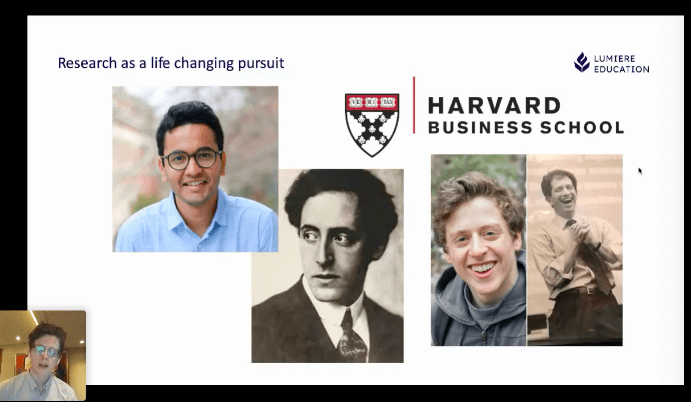
Why Stephen is passionate about research
Stephen actually met his co-founder at Harvard business school while pursuing his academic research. Further, met and was affected by important, influential mentors (see above). The Turban family also has a unique history of research influencing their life path.
More broadly, Stephen noted how important research impacts not only your life and personal growth. It also impacts the external world to develop new technologies and societal innovations.
About Stephen’s current work:
Founded by Harvard alumni, the Lumiere Research Scholar Program helps high school students work one-on-one with a scholar on an independent research project. Lumiere research mentors come from top research universities like Stanford, Yale and Harvard.
At the end of the program, students develop an independent research piece that could be used for college admissions or future studies.
Next, let’s get into the insights we learned at the webinar.
What exactly is research?
Stephen describes research as a fluid field. His definition is really any “learning under uncertainty.” So, if you’re naturally curious and independently motivated, it’s a great way to flex your skills.
He also noted that research in a traditional sense is actually available in many fields – so nearly any interest area can get involved! For example, you can conduct different kinds of research in subjects from Gender Studies to Computer Science. The subjects listed in the graphic below are all valid areas to conduct research.
Another example, close to Stephen’s own work: entrepreneurship! When you start a new venture, you are creating under uncertainty, so there is a lot of organic overlap.
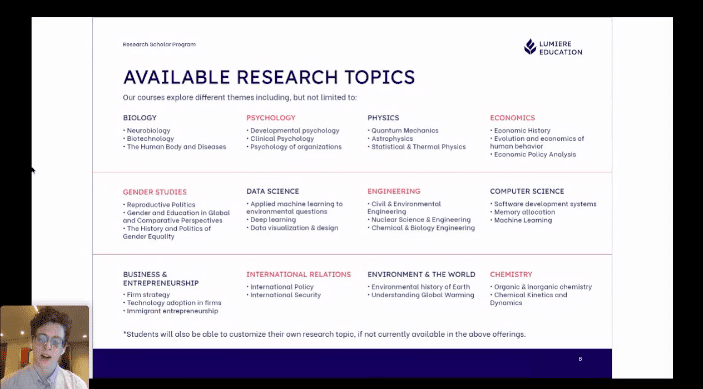
He continued, research is a valuable opportunity to learn something that has never been learned before (or learned incorrectly). If you’re ready to get started, find something you’re interested in answering, and pursue it!
This passion led Stephen to start Lumiere, and provide high school research advice to passionate students.
Importantly, he also cautions research is a very iterative process. That means that you might not get it right the first time, but that’s okay. Keep investigating, exploring, and taking notes on the intellectual journey.
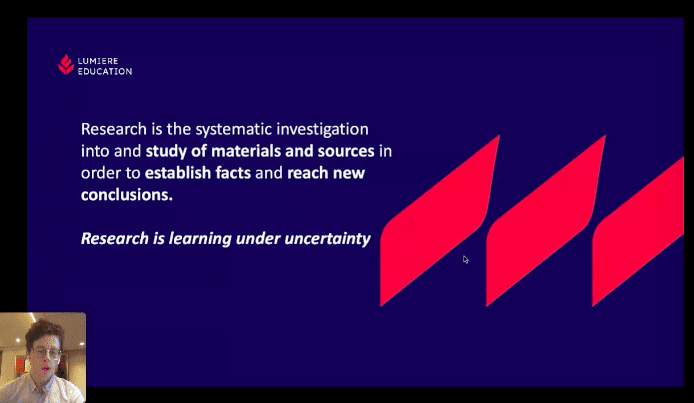

Why is research important to the world, and for college admissions?
Research allows students and academics (like you!) to learn about yourself. To be specific, you might learn what you enjoy studying. You could stumble upon some new senior thesis ideas when you get to college. Beyond that, you can start learning what a good next step in your career might be in a very hands-on way.
Research also pushes individuals to learn about the world, and potentially impact future study and developments. Whether your great breakthrough happens now or in undergraduate study, there’s always something new to learn. That is why taking this high school research advice forward into life can help you succeed, no matter where you go next.
On that note… For college admissions, conducting high quality research provides the opportunity to differentiate yourself from peers. Doing so, you can demonstrate your initiative and ambition and drive.
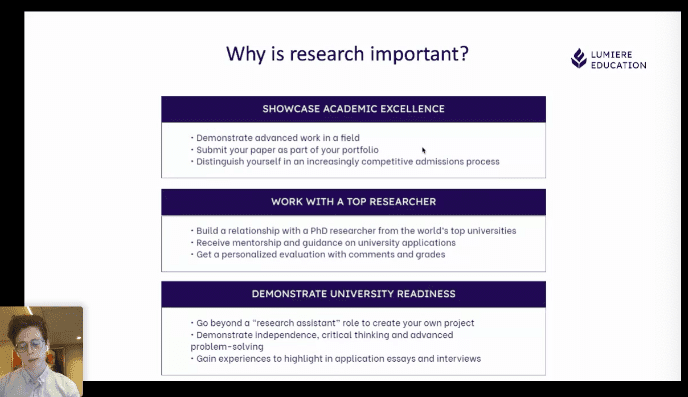
Looking for ways to get involved?
If you’re itching to start your own project, keep in mind: there are so many methodologies! For starters, you can pursue:
Video: Harvard graduate student shares the scientific context that drives his public engagement work
Lab-Based Research
Lab-based research involves conducting experiments in controlled environments, such as laboratories, to analyze specific phenomena or test hypotheses. This approach is prevalent in fields like biology, chemistry, and physics, where variables can be isolated and manipulated.
By maintaining strict control over experimental conditions, researchers can ensure accurate, replicable results. For example, a high school project might investigate the effects of different pH levels on plant growth, which requires precise environmental settings.
However, lab-based research often necessitates access to specialized equipment and facilities, which may pose challenges for high school students. Collaboration with local universities or online simulations can help overcome these limitations.
While this method ensures precision, its reliance on artificial settings can sometimes make it difficult to extrapolate findings to real-world conditions, requiring additional contextual studies.
Quantitative Research
Quantitative research focuses on gathering and analyzing numerical data to identify patterns, trends, or relationships. This type of research is widely used in disciplines such as economics, psychology, and medicine to provide statistically significant insights. For instance, a student might use surveys to measure how screen time affects academic performance, employing tools like spreadsheets or statistical software for analysis.
While quantitative methods offer a structured approach and enable generalization across larger populations, they may lack the depth needed to explore individual experiences or unique scenarios. Additionally, collecting reliable data requires carefully designed instruments, such as questionnaires or experiments, to minimize biases and ensure validity. This makes quantitative research ideal for projects that require measurable, objective outcomes.
Qualitative Research
Qualitative research emphasizes understanding complex phenomena through non-numerical data such as interviews, observations, or text analysis. This approach is particularly useful in exploring personal experiences, social behaviors, or cultural contexts.
For example, a student could interview peers about their attitudes toward climate change, uncovering insights that quantitative data might miss.
Despite its strengths, qualitative research has limitations, including potential subjectivity and challenges in ensuring replicability. It requires researchers to carefully interpret data without introducing personal biases. High school students engaging in qualitative research can benefit from guidance on developing open-ended questions and employing systematic methods for organizing and analyzing their findings, such as coding qualitative data.
Theoretical Research
Theoretical research is centered on developing models, frameworks, or abstract concepts to advance understanding in a particular field. This type of research is common in mathematics, philosophy, and theoretical physics, where real-world experimentation may not be feasible.
For instance, a student might explore game theory concepts to understand decision-making processes in competitive environments.
While theoretical research encourages innovation and critical thinking, it can be challenging for students due to its abstract nature and lack of tangible results. It is often best complemented by other research methods to validate or apply its findings.
Access to scholarly articles and mentorship from experts can significantly enhance a student's ability to tackle theoretical topics effectively.
Applied Research
Applied research is designed to address specific, practical problems, often with the aim of implementing immediate solutions. This type of research is commonly used in fields like engineering, medicine, and business.
For example, a high school student might develop an app to track carbon emissions as part of a sustainability project.
The outcomes of applied research are typically practical and actionable, making it particularly appealing for projects with real-world impact. However, it often requires collaboration with industry experts or institutions to ensure relevance and effectiveness.
While it is highly solution-oriented, it may lack the exploratory breadth of basic research.
Basic Research (Pure Research)
Basic research aims to expand fundamental knowledge without focusing on immediate applications. It often serves as the foundation for applied research by providing a deeper understanding of underlying principles.
Although it does not always lead to immediate practical outcomes, basic research is invaluable for advancing science and technology. Students engaged in this type of research should focus on curiosity-driven questions and rely on thorough literature reviews to identify gaps in existing knowledge.
Exploratory Research
Exploratory research is conducted to investigate an area of interest where little is known, often generating new ideas or hypotheses. This type of research is particularly useful at the early stages of a project to refine research questions.
While exploratory research is flexible and creative, it is less structured and may lack definitive outcomes. Its primary purpose is to guide future research rather than provide conclusive results. Students can benefit from brainstorming techniques and broad data collection methods, such as open-ended surveys or informal interviews.
Descriptive Research
Descriptive research seeks to provide a detailed account or representation of a specific phenomenon. It is often used in social sciences to document behaviors, trends, or characteristics.
This method excels at generating rich, contextualized data but does not establish causal relationships. Students conducting descriptive research should focus on accurate data collection and clear presentation, ensuring their findings are easily interpretable by others.
Correlational Research
Correlational research examines the relationship between two or more variables to identify patterns or associations. This method is commonly used in psychology, education, and economics.
While correlational research is valuable for uncovering connections, it cannot establish causality, meaning it cannot prove one variable directly causes another. Students must be cautious when interpreting results and ensure their data collection methods are robust and reliable.
Action Research
Action research is conducted to solve specific problems within a particular context, often involving iterative cycles of observation, action, and reflection. This type of research is commonly used in educational settings, such as improving classroom teaching methods. A high school project might involve testing and refining strategies to reduce food waste in the cafeteria.
The collaborative and dynamic nature of action research makes it effective for immediate improvements, but its localized scope can limit broader applicability. Students conducting action research should involve stakeholders in the process and document each step carefully to ensure transparency.
Mixed-Methods Research
Mixed-methods research integrates both qualitative and quantitative approaches to provide a comprehensive understanding of a research question. This type of research is especially useful for complex topics that require multiple perspectives. For example, a project on mental health awareness could combine surveys for statistical insights with interviews to explore personal experiences.
While mixed-methods research offers a balanced approach, it can be time-consuming and require a higher level of expertise to manage and analyze different types of data. Students should plan their methodology carefully and seek guidance to ensure both qualitative and quantitative elements complement each other effectively.
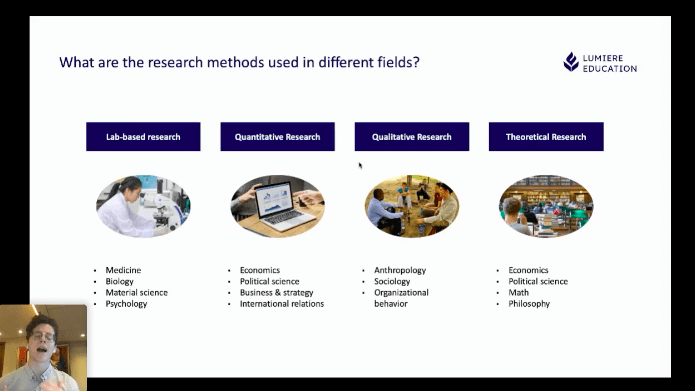
Find what you’re curious about and decide what method works best for you.
What to learn about what your pathway and mentorship could look like? Here are the three most common situations you can access as a high school student:
- Structured research programs: you apply and earn a place to gain access to resources.
- Research assistant work: you apply and gain experience working on an existing project.
- Individual independent research: done on your own, which is slightly more challenging, but open if other options aren’t available.
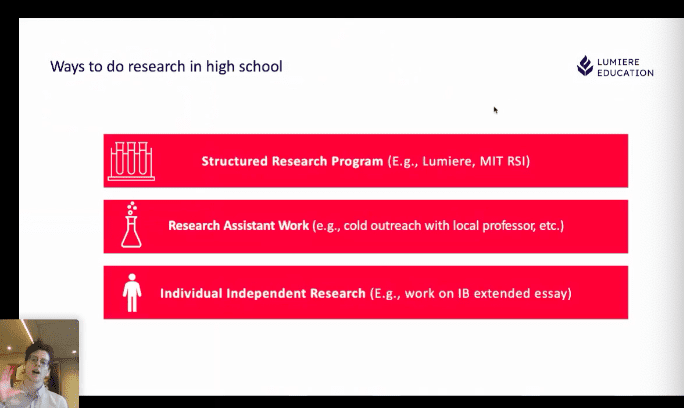
How to find a good mentor
Keep in mind: when you are searching for someone to help guide and advise your project, “shiny” names aren’t everything. This is a key piece of high school research advice — and beyond! What you do want is someone who is able to work at the top of the field. They will know what questions matter and deserve focused attention.
One-on-one access is best, when possible, to help you grow the most from your mentorship.
And here’s an underrated aspect of mentorship: find someone who can help you write well! This doesn’t have to be your project advisor, but look for someone who can also help with this. It will make sure your research paper and reporting is effective.
Step-by-Step Guide on How to Conduct Research
Step 1: Brainstorming and Choosing a Research Topic
The first step in conducting research is identifying a topic that genuinely interests you and aligns with your skills and resources. Begin by brainstorming broad ideas, such as environmental issues, technology advancements, or social behavior, and narrow them down to specific questions. For instance, instead of studying "climate change," you could focus on "the impact of urban green spaces on local temperatures." This refined approach helps create a manageable and focused project.
When selecting a topic, consider its relevance and feasibility. Ensure that sufficient resources, such as data or literature, are available to support your study. Consulting mentors or teachers can provide guidance on selecting a topic that is both innovative and practical. By investing time in this stage, you set a strong foundation for the rest of your research journey.
Step 2: Conducting a Literature Review
A literature review involves studying existing research to understand the current state of knowledge on your topic. This step helps you identify gaps in the literature, ensuring that your research question is original and significant. Use reliable sources like academic journals, books, and reputable websites. For example, platforms like Google Scholar, JSTOR, or your school library’s database are excellent starting points.
When conducting a review, take detailed notes and organize your findings thematically. This will help you identify patterns and relationships in the data. A thorough literature review not only strengthens your understanding of the subject but also informs your methodology and theoretical framework, saving you time later in the research process.
Step 3: Formulating a Hypothesis
Once you have a clear understanding of your topic, the next step is to formulate a hypothesis or research question. A hypothesis is a testable prediction about the relationship between variables, such as "Increased screen time negatively affects academic performance." If your research is exploratory, you might focus on open-ended questions like, "What factors influence students’ time management?"
Your hypothesis should be specific, measurable, and grounded in your literature review. This clarity ensures your research remains focused and provides a framework for data collection and analysis. A well-crafted hypothesis also enhances the credibility of your study by demonstrating a clear purpose and direction.
Step 4: Collecting and Analyzing Data
Data collection involves gathering information to test your hypothesis or answer your research question. Depending on your study, this could involve surveys, experiments, interviews, or observational studies. For example, a student studying the effects of screen time might distribute questionnaires to peers or monitor their own habits over time. The choice of method should align with your research objectives and resources.
Once data is collected, analysis begins. Quantitative data often requires statistical tools, such as Excel or statistical software like SPSS, while qualitative data might involve thematic coding. Be thorough and systematic to ensure accuracy and reliability. This stage is crucial for drawing valid conclusions and answering your research question effectively.
Step 5: Writing a Research Paper
The final step is presenting your findings in a structured research paper. This document typically includes sections such as an abstract, introduction, methodology, results, discussion, and conclusion. Each section serves a distinct purpose: the introduction sets the context, while the discussion interprets the results. Clear, concise writing ensures your audience understands your work.
Citations are vital to maintain academic integrity and acknowledge prior research. Use proper citation styles, such as APA or MLA, depending on the guidelines provided. A polished research paper not only communicates your findings but also reflects your dedication and professionalism, paving the way for future academic or professional opportunities.
Benefits of Research Beyond College Admissions
Engaging in research equips students with valuable skills that extend far beyond the college application process. Research fosters critical thinking, problem-solving, and analytical abilities, which are essential in both academic and professional settings. It also nurtures curiosity and a proactive mindset, encouraging students to seek innovative solutions to real-world problems.
For instance, understanding how to conduct a literature review or analyze data can be applied to various career fields, from science and technology to business and the arts. These skills not only enhance employability but also prepare students to navigate the complexities of modern work environments.
Beyond skill development, research contributes to personal growth by promoting perseverance, self-discipline, and effective communication. Collaborating with mentors, peers, or industry experts helps students build networks and gain insights into potential career paths. Additionally, the experience of overcoming challenges during research projects fosters resilience and adaptability—qualities that are valuable in lifelong learning.
Whether students pursue academia, entrepreneurship, or other professional fields, the ability to ask meaningful questions and seek answers positions them for sustained success.
Resources for Finding Research Opportunities
Video: BIG PhD students Q&A: Can you speak about the research opportunities in the Harvard BIG PhD track?
Online Platforms for Research Programs
Many online platforms connect students with research opportunities, providing access to mentors, workshops, and project frameworks. Websites like Zooniverse.org host crowd-sourced research projects in various fields, allowing students to contribute to ongoing studies in astronomy, biology, and more. Similarly, platforms such as Lumiere Research Scholar Program pair students with academic mentors for guided, independent research experiences.
When using online resources, prioritize websites with trustworthy domains like .edu, .gov, and .org. These domains are associated with educational institutions, government bodies, and nonprofit organizations, ensuring credibility. Avoid relying on blogs or forums with less authoritative domains, as they may lack verified information or scholarly oversight.
Public Databases and Journals
Accessing public databases and journals allows students to explore existing research and identify areas needing further study. Platforms like PubMed.gov, arXiv.org, and Google Scholar provide free or affordable access to scholarly articles. These resources help students refine their research questions and methodologies by reviewing established studies.
Websites with .gov domains, like PubMed, are government-regulated and known for their accuracy and reliability. Open-access repositories like arXiv.org are also highly regarded in academic circles. Students should critically evaluate any content from domains like .com or .net, as these may not undergo the same rigorous peer-review processes.
Addressing Potential Challenges and How to Overcome Them
Time Management
Balancing research with academic, extracurricular, and personal commitments is a common challenge. To overcome this, students should create a detailed schedule, breaking tasks into manageable chunks with specific deadlines.
Tools like calendars and task management apps can help stay organized and prioritize effectively.
Limited Access to Resources
High school students may lack access to specialized equipment, databases, or mentors. To address this, students can seek collaborations with local universities, utilize open-access platforms like Google Scholar, and explore community resources such as public libraries or online forums.
Difficulty Formulating a Research Question
Narrowing down a broad idea into a specific, researchable question can be overwhelming. Engaging in brainstorming sessions and conducting a literature review can provide clarity. Consulting with teachers or mentors early on can also help refine the scope and direction of the project.
Maintaining Motivation
Long-term research projects can be draining, especially when progress is slow. Setting short-term goals and celebrating small milestones can help sustain motivation. Additionally, focusing on the real-world impact of the research can provide renewed inspiration to persevere.
Ensuring Data Accuracy
Errors in data collection or analysis can compromise the validity of a project. To prevent this, students should double-check methodologies, use reliable tools, and document processes meticulously. Seeking peer reviews or feedback from mentors can also catch errors early.
Finally, who makes a good candidate for research?
Some final tips to send you on your way to success:
- Don’t forget to be flexible and open-minded.
- Pursue what makes you passionate and motivated. Be specific about your interests.
- Do the legwork. Build foundational knowledge and hone your skills as much as possible.
- Find a strong, supportive mentor to learn from (and with).
- Put yourself out there and see if you can get your work published.
- Don’t get discouraged!
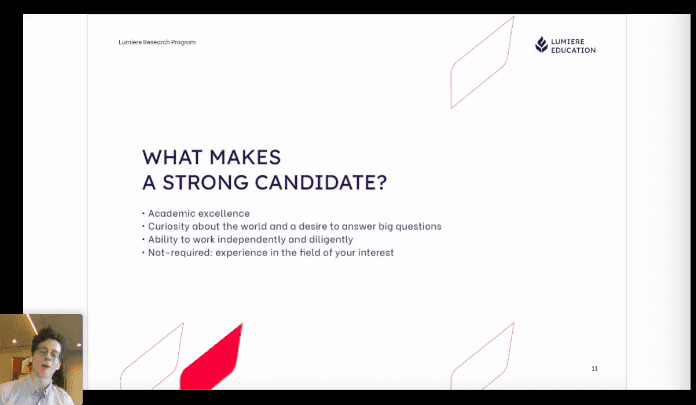
High School Research: Final Thoughts
Research is not just a skill—it’s a gateway to discovering your passions, solving real-world problems, and making meaningful contributions to society. Whether you’re a high school student exploring your first project or looking to expand your research portfolio, now is the perfect time to take the first step.
Start by identifying topics that inspire you, exploring credible resources, and seeking out mentors or programs that can guide you. The journey may be challenging, but the rewards—personal growth, academic success, and the opportunity to create a lasting impact—are well worth the effort.
Don’t wait to unlock your potential. Explore the resources mentioned, reach out to educators, and dive into the exciting world of research. With the right mindset and tools, you can turn curiosity into innovation and ideas into action. Begin your research journey today and see where your curiosity takes you.
Work with Us!
Ready to turn your college admission dreams into reality? Join the 98% of students who have worked with Empowerly and been accepted into Ivy League and top 25 schools. Our college counselors are the best-rated in the country and have proven to improve college admission rates by 11x. Book your FREE consultation today.
Additional Resources
Students interested in combining academics with extracurricular learning might benefit from these 25 Science Internships for High School Students (2024) to expand their knowledge and skills.
Exploring internships can significantly enhance your research experience. Check out these 40 Internships for High School Students to find opportunities that align with your interests.
If you’re searching for specialized programs, these 40 Incredible Research Opportunities for High School Students offer unique chances to delve deeper into your field of interest.
